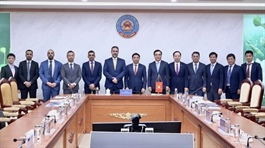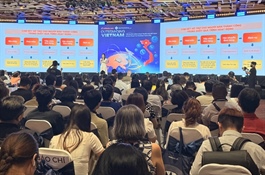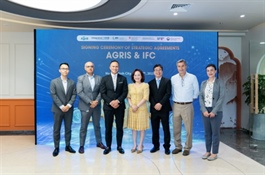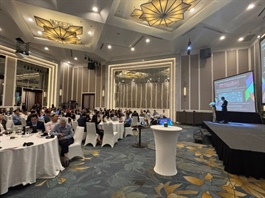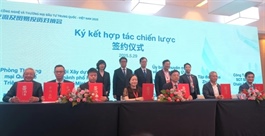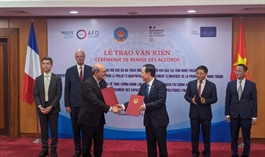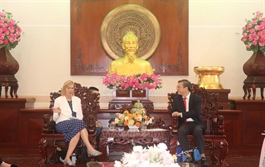‘Not business as usual’: Việt Nam urged to fast-track innovation drive
‘Not business as usual’: Việt Nam urged to fast-track innovation drive
Leading scientists are calling for heavy investment in core technologies as part of Việt Nam’s push to build a robust innovation ecosystem under Resolution 57.

A student operates a ball-picking robot during a robotics contest in Hà Nội in 2024. — VNA/VNS Photo |
Việt Nam must push ahead with its directive to accelerate national development through science, technology and innovation, which experts say could reshape the country’s growth strategy amid intensifying global competition.
At a national seminar held in Hà Nội recently, policymakers and scientists called for swift and coordinated action to turn 'Resolution 57' into reality.
Resolution 57, referred to the one adopted by the ruling Việt Nam Communist Party on December 22, 2024, aims to remove institutional roadblocks and open new space for creativity in science-technology development and digital transformation.
Vũ Văn Tích, director of the Academy of Science, Technology and Innovation, told the seminar that although science and innovation had long been a policy priority, their contribution to growth and productivity remained modest.
"Science, technology and innovation are not optional; they are a mandatory path if Việt Nam wants to leap forward," he said.
He likened Resolution 57 to the historic 'Khoán 10' (Contract 10), which revolutionised the country's mode of agriculture production in the 1980s. Just as Contract 10 once unleashed a wave of agricultural productivity, Resolution 57 would do the same for the economy in the years to come, Tích said.
Tích pointed to markets like South Korea, Japan, Singapore, Taiwan (China), and Israel, which achieved breakthroughs by investing in science, fostering elite education, and building robust innovation ecosystems.
In contrast, Việt Nam continued to struggle with low R&D investment, weak research-to-market linkages, and a limited share of locally generated value in GDP - about 40 per cent, he said.
"We need a fundamental change in mindset," Tích said, "especially in innovation culture. Without accepting risk and failure, we cannot develop advanced technologies."
In general, researchers, policymakers and business leaders are hailing the new resolution as a decisive step towards building a modern, innovation-led economy.
Phạm Thị Thanh Ngà, an expert at the Institute of Meteorology, Hydrology and Climate Change, said "the issue of the resolution is especially timely".
She cited alarming trends in climate data, such as the average global temperature increasing by 1.58 degrees Celsius compared to pre-industrial levels by the end of April 2025, breaching the 1.5 degrees Celsius threshold set in the Paris Agreement.
"This is the result of human activity and resource overexploitation," she said, adding that deepening scientific insight is essential for reducing disaster risks, protecting lives, and ensuring sustainable development.
Ngà also praised the resolution’s emphasis on expanding research infrastructure and promoting international cooperation.
"We can bring advanced solutions to solve Việt Nam’s problems, and we can contribute our challenges to the global research agenda," she said.
Female scientists now make up around 45 per cent of the research workforce in Việt Nam. She said that Resolution 57 would provide an opportunity to unlock the full potential of women in science by supporting their participation in high-impact research, public-private partnerships, and international collaboration, while promoting gender equality in STEM fields.
Businesses at the centre
The resolution signals a shift in innovation strategy by placing private enterprises, particularly domestic firms, at the centre of the national innovation ecosystem.
"We must centre our innovation efforts around businesses, and private companies should be the pillars of our strategy," Minister of Science and Technology Nguyễn Mạnh Hùng said.
Nguyễn Thị Mai Hương, chief operating officer of Hachi Vietnam High Technology JSC, said the resolution provided strategic direction not only for sustainable agriculture but also for confronting climate change, labour shortages in rural areas, and increasing global competition.
"Hachi has deployed more than 250 smart greenhouse models across Việt Nam, from lowland farms to mountainous border areas," Hương said. "Using smartphone-controlled climate systems, local farmers can grow clean vegetables and medicinal plants year-round, regardless of weather conditions."
Hachi’s low-cost greenhouses and AI-based hydroponic systems have helped Central Highlands farmers increase yields by 30 per cent while reducing water usage by 40 per cent.
However, former Minister of Science and Technology Nguyễn Quân said that outdated regulations continued to stifle innovation, particularly around ownership of research outcomes.
"In other countries, scientists automatically own their research results, even if they’re funded by public money. In Việt Nam, the State retains ownership, making commercialisation nearly impossible," he said.
Quân praised the mechanisms introduced under Resolution 57 and also Resolution 193 (issued by the National Assembly on piloting special policies for science and technology development) to provide policy tools for innovation, including lump-sum research contracts, public procurement, venture capital and risk tolerance.
However, he expressed concern over delays in implementation.
"Leaders are highly committed, but progress at the provincial and middle levels remains sluggish," he said. "Many local governments are still drafting action plans when some of the resolution’s provisions could be applied immediately."
"We can’t implement Resolution 57 as business as usual - we need a real race," Quân warned. "If we fail to act quickly and decisively, we will miss this window of opportunity."
A strategic pivot
Trần Đình Thiên, former director of the Vietnam Institute of Economics, said science and technology must be repositioned from a supporting role to a guiding force in national development.
"Việt Nam needs to become a sci-tech nation," Thiên said. "This is not just about fixing administrative barriers; it’s about changing the country’s trajectory."
He contrasted Northeast Asia’s innovation-led development model with the more traditional approach in Southeast Asia, noting that the former places science at the centre of growth policy.
"If we want real transformation, the State must act as a foundational enabler and create meaningful competition to drive innovation," he said. "Slogans are not enough. What we need is real competition - this is the only foundation for substantial innovation."
Thiên also pointed to the lack of leadership from major domestic corporations in Việt Nam’s innovation efforts, calling for a stronger role for national champions in leading technology development.
Nguyễn Thanh Thủy, president of the Vietnam Association for Information Processing, echoed the call for targeted investment in core technologies such as artificial intelligence, biotechnology and digital finance.
He cited South Korea’s structured investment in R&D through chaebols and national institutes, Singapore’s 'Smart Nation' strategy, and China’s focus on AI, 5G and robotics, backed by talent policies and innovation finance.
Thủy called for a clear national strategy in which the government plays a leading role and acts as a major customer for core technologies.
He also proposed the creation of a layered innovation startup ecosystem that includes incubators, tax incentives, venture funds, and national-level challenges similar to South Korea’s K-Startup Grand Challenge.
"Việt Nam also needs to build a technology sandbox framework and enhance collaboration between universities, businesses and the government in commercialising scientific research," Thủy said,
- 08:50 31/05/2025








